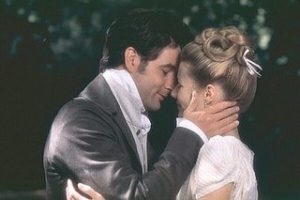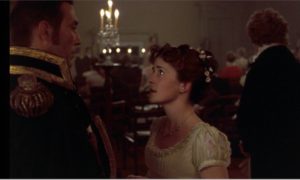On the 200th anniversary of Jane Austen’s death, what better way is there to honor this extraordinary author than to give thanks for what she has left us? For me, her work is a timeless guide to living life in the no-BS zone, wrapped in an infinitely re-readable set of six novels.
If I could assign a motto, a credo to the the Austen canon, I would say it could be summed up in this one line from Pride and Prejudice: “Disguise of every sort is my abhorrence.” The fact that Mr. Darcy delivers this line while in the midst of a serious marriage-proposal fail makes it even more resonant: Darcy may be honest, but the brutality of his honesty indicates that he’s hiding behind his angry pride. He’s yet to unmask that part of his own disguise, but being an Austen hero, we know that he will.
That’s the genius of Austen, who calls out her characters on their disguises and their dishonesty. Which leads them to their moment of revelation, their grand character arc, and their ultimate reward–love and happiness.
Along the way, Austen makes us laugh, which makes the hard truths easier to bear. And thus we can begin to see ourselves in it all.
That’s Austen: keeping us real and calling us out. She’s been doing it for 200 years. And that’s no small feat for someone who lived in a society in which polite demurrals, refusals, and denials were a socially mandated matter of form.
Here are 10 gems of Austen wisdom to help you reach your own character arc.
1. A real friend is the one with the guts to tell you the ugly truth.
In Emma, Mr. Knightley was the only person with the courage to tell Emma that her treatment of Mrs. Bates was cruel. Emma was shocked and chastened. And set about making amends. Which also put her on the road to realizing that Knightley’s bossiness was maybe just a little bit attractive; no scratch that, super hot. 
2. Self-destruction is NOT romantic.
In Sense and Sensibility, a heartbroken Marianne was well on her way to passive suicide. As she realized, once she recovered, her willful self-neglect in the wake of devastating heartbreak was nothing less than self-centeredness. As she confessed to her sister Elinor, “I wonder at my recovery,–wonder that the very eagerness of my desire to live, to have time for atonement to my God, and to you all, did not kill me at once. Had I died,–in what peculiar misery should I have left you, my nurse, my friend, my sister!”
3. You will become (or already are) the thing you judge.
Elizabeth Bennet spends a good deal of Pride and Prejudice judging Mr Darcy for his pride and his arrogance. Until she realizes that she too has exhibited exactly the qualities she disliked him for: “Had I been in love, I could not have been more wretchedly blind. But vanity, not love, has been my folly…Till this moment, I never knew myself.”
4. Be discerning as to which book you live your life by.
Though this very post suggests that the Austen canon is full of wisdom to live by, it’s important to stress that one should not apply this advice to every other book you might like. In other words, there is no substitute for discernment. As Catherine Morland of Northanger Abbey discovered, just because gothic horror novels thrilled her, didn’t mean they were also full of life lessons. Therefore, if reading horror fiction makes you think that every person you don’t like must also be an axe murderer, you might consider switching genres.
5. You are never powerless, even if you are a creepmouse.
Henry Tilney of Northanger Abbey said that women have “only the power of refusal.” But in Mansfield Park, Fanny Price shows how powerful refusal can be. Her refusal of Henry Crawford sets off a chain of events that results in scandal, divorce, heartbreak, and which nearly brings a powerful family to its knees. Not that she does it for power or even thinks of herself as powerful. She’s been a timid, self-denying doormat and neglected poor relation for so long that she could hardly conceive of herself as powerful. She may not be the most exciting or charismatic of Austen’s heroines, but that girl shows remarkable spine and resolve and courage in standing up to pretty much everyone. She knows that Henry Crawford is wrong for her, and that’s all there is to it. BTW, The Paris Review’s defense of Fanny Price is well worth reading.
6. Be a keen observer.
Anne Elliot may come off as a passive heroine, but her keen observations of human nature are almost like a superpower, much like Austen herself. Case in point: Despite Captain Wentworth’s flaunting his supposed indifference to her by publicly paying lots of attention to Louisa Musgrove, Anne knew he wasn’t in love with Louisa. There had been a ton of stinging rejection, and so even after Anne learned that Louisa was going to marry someone else, and that Captain Wentworth was now, like Anne, in Bath, most women would need the equivalent of a cartoon anvil dropped on their head to convince them that this man had the slightest bit of interest in her.
And yet Anne knew, from a single conversation in a public place, that he had much more than the slightest bit of interest in her. “His choice of subjects, his expressions, and still more his manner and look, had been such as she could see in only one light…all declared that he had a heart returning to her at least….She could not contemplate the change as implying less. He must love her.” Superpower indeed.
7. Admit that you don’t know everything.
Emma is Austen’s supreme know-it-all. And like most know-it-alls, she knows nothing. Emma fancies herself a matchmaker while continuing to misread one situation after another, most especially the ones that apply to herself. She’s so busily moving people around like chess pieces that she fails to see the damage she’s inflicting. Until, that is, her friend Harriet Smith decides to fall in love with the one man who might actually inspire Emma to reconsider her decision never to marry. Thankfully, this is Austen, which means that Emma has her revelation, repents her arrogance, and all is happily ever after.
8. A good face doesn’t guarantee a good heart.
How many of us have fallen in love with someone so gorgeous we just know he must have a heart to match? And sometimes, that gorgeous person is really, really good at hiding who he actually is. Which is how Marianne falls for Willoughby, and Elizabeth Bennet (briefly) falls for Wickham. And which is why once again, discernment and observation are key qualities to be cultivated. Because let’s face it, if Marianne (and Elinor and their mother) weren’t so enamored of Willoughby, they would have wondered aloud a lot sooner as to why the man didn’t propose to Marianne. After all, this is an age in which men propose after a few dances and maybe a dinner. And this dude was practically living at their house for a lot longer than that. As for Wickham, Elizabeth later admits to herself, when unpleasant truths come out, that it was highly inappropriate for him to share with her his personal gripes against Darcy almost as soon as they met.
9. A reformed rake is an oxymoron.
I can’t help but be sad about this one, especially when it comes to Henry Crawford of Mansfield Park. I really wanted him to be for real, and I really wanted him to marry Fanny Price. Because Fanny Price plus Edmund Bertram pretty much equals boring. Sorry. But they’re happy, so I will endeavor to be happy for them. And I will continue to marvel at the brilliance of Austen in crafting a story that could have had an alternate ending. A very plausible alternate ending. And which I fool myself into thinking may happen every time I re-read the book. But it can’t happen. Why? Because a player is a player is a player. And we can’t have an Austen heroine marrying a player.
10. Cruelty is not okay. Even when it’s tempting.
Who wouldn’t be tempted to laugh at Mr. Rushworth of Mansfield Park? The man might as well be wearing a target in his back with his pink cloak and his “two-and-forty speeches” and his general lack of grey matter. But he’s a human being, and Fanny Price, being a kind, compassionate soul, takes pity on him. She helps him and coaches him, as he seems to be as fundamentally incapable of learning his lines as he is painfully aware of how much attention his wife-to-be is bestowing on another man. Kindness doesn’t always look to be as much fun as making someone else the butt of our jokes, but it’s the right thing, the human thing, the decent thing, to do. And darn it, Miss Austen, you make us laugh at Mr. Rushworth’s pink cloak anyway.
What gems of Austen wisdom have you discovered?



Brilliant! Loved this breakdown. I agree with your analysis and especially of “Mansfield Park”–except I wonder if they were really happy or just content.
Thank you, Christina! I have wondered about those two as well. For Edmund to fall in love with two such completely different women as Mary Crawford and Fanny Price is in itself astonishing. Though I like the thought of friends becoming more than friends and of Edmund finally realizing what a treasure Fanny is. But is it truly romantic love? I don’t know about that. And the fact that they don’t really complement each other or challenge each other…anyhow, I am still wondering. :))